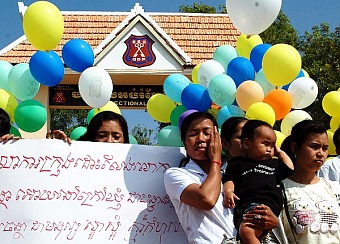Supporters Gather Outside Cambodia's National Prison to Seek Release of Imprisoned Union Leader
Published on 21 January 2011On the morning of January 16, 2011, over a hundred garment workers and civil society members gathered outside Cambodia's Prey Sar prison to seek the release of their union leader, Sous Chantha. Joined by Chantha's wife and toddler, the group held a religious ceremony and proceeded to launch balloons in the air for Chantha to see from within the prison's walls.
The gathering highlighted the fact that Sous Chantha has spent nearly two months in pretrial detention on drug trafficking charges. His arrest on November 18, 2010, followed his 1,000-member union's migration to the pro-workers Coalition of Cambodia Apparel Workers Democratic Union (CCAWDU).
Information gathered by LICADHO strongly suggests that Chantha was framed in retaliation for changing his union's affiliation.
Background
Chantha had worked for the United Apparel Garment factory (formerly Lotus Garment factory) for four years, and had been the leader of his factory's local union for two years. The union had been affiliated with the Independent & Democratic Union Federation (IDUF) since 2008.
In late 2010, IDUF banned its factory union from advocating for basic labor rights, which led Chantha and his union members to withdraw their affiliation. On November 18, after three days of discussion with CCAWDU, Chantha signed documents confirming the transfer of his union's 1,000 members from IDUF to CCAWDU.
Later that evening, he left work on his motorbike. He had parked the bike inside the factory grounds, as he always did. He had travelled barely 400 meters before his ordeal started.
The arrest and questioning
Military police on motorbikes stopped Chantha on Street 2002 in Phnom Penh's Sen Sok district and began questioning him for no apparent reason. Finally, one officer demanded Chantha's keys, so that he could search his motorbike. Upon conducting the search, the officer found nine small packets containing crystal methamphetamine (also known as ice).
Officers took Chantha to a military police station for further questioning. He denied possessing drugs and told police that he believed the drugs had been planted in retaliation for his union's transfer from IDUF to CCAWDU.
Despite this, Chantha was charged with drug trafficking and forced to spend the night at the police station. He was taken to the municipal court the next day. Outside the court, union leaders and more than 200 workers from his factory gathered to protest his arrest and demand his release.
At the court, Chantha was questioned again by an official. He denied for a second time that he was in possession of drugs and repeated his claim that he had been framed. Investigating Judge Phou Pov Son nevertheless placed him in immediate pretrial detention. Throughout the proceeding, the judge never actually questioned Chantha directly.
A mysterious roadblock
The many irregularities in Chantha's case include contradictions in the police report: officers had told Chantha that they were tipped off about the drugs, and that authorities had been following him for three days.
However, the military police's own report claimed that they had been setting up a roadblock to search vehicles for weapons, and only stopped Chantha when they saw him passing and became suspicious. LICADHO has independently confirmed that there was no roadblock in place at the time.
If convicted, Chantha faces a sentence of two to five years imprisonment.








